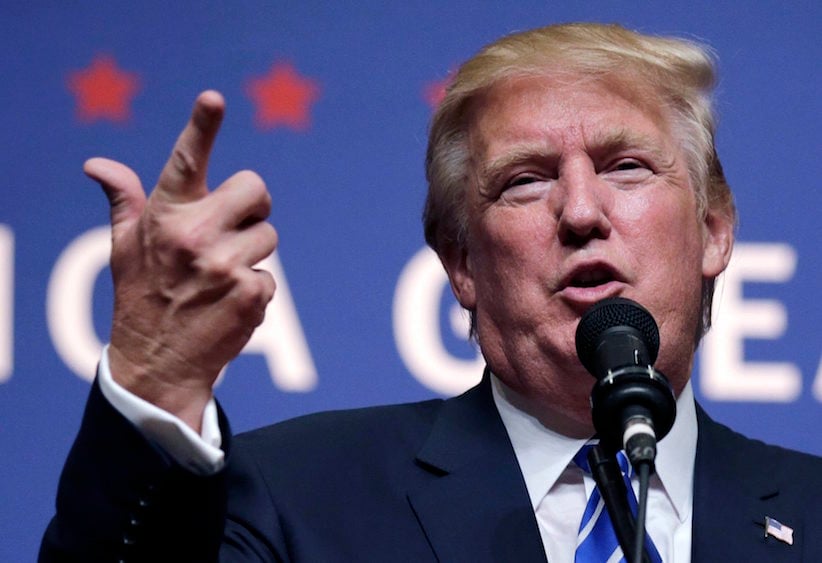The Donald Trump of ancient Rome?
Comparing America to Rome used be an old parlour game. But a bestselling book offers too many echoes to be ignored
Republican presidential candidate Donald Trump gestures during a campaign stop at Winnacunnet High School in Hampton, N.H., Friday, Aug. 14, 2015. (AP Photo/Charles Krupa)
Share

The now-venerable trope of America as the New Rome is a good seven decades old now, born in the post-1945 era when the U.S. first began to bestride the narrow world like Shakespeare’s colossal Julius Caesar. It could hardly be helped, given the superpower’s surface resemblance to a certain Italian city-state (of similar rustic constitution) when some 2,200 years ago it suddenly loomed over the entire ancient world.
It was the military aspect, inevitably, that commentators first seized on: the stand-off with that New Carthage, the U.S.S.R., the ability to project raw power to any corner of the world, and the deeper worry that the domestic democracy, like its Roman forerunner, might slide into autocracy under the pressure of imperial responsibilities.
This was always the next thing to a parlour game, of course. As long as U.S. politicians, unlike Caesar and Pompey, weren’t amassing personal armies, an American emperor was simply fodder for novels and films like Seven Days in May, and for the paranoid fringes of first the Left (a liberal president defends the constitution in Seven Days) and currently the Right, sectors of which believe their own federal government is coming for them and their guns.
But the Roman penumbra has not gone away from the Western world. In part, that’s because it’s simply too huge a part of our heritage. As Cambridge classicist Mary Beard puts it in her magisterial (and bestselling) SPQR when referencing, “how Rome declined and fell, if indeed it ever did,” it’s impossible to briefly list the highlights of the eternal city’s eternal influence. Rome is literally the source of much modern political terminology: republic, senate, party, dictator, candidate, rostrum, and on and on. “A Republic, if you can keep it,” was Benjamin Franklin’s summation of the work of America’s founding fathers, who clearly had one eye on Rome’s conceptual legacy of liberty and citizenship, and another on imperial despotism. Nearly a century later, John Wilkes Booth used “Ides,” as in the date of Caesar’s assassination, as code for the day he planned to kill Abraham Lincoln.
For the most striking comparison, consider the conservative group Citizens United and its legal battle against the Federal Election Commission. The U.S. Supreme Court’s ruling in Citizens United’s favour in 2010 lifted the limits on political contributions, opening the floodgates for direct corporate financing of campaigns. It’s impossible to think of the torrent of money the decision unleashed on the electoral system and not to think of Marcus Licinius Crassus, the obscenely wealthy third wheel in the Caesar-Pompey-Crassus triumvirate. Crassus, incidentally, amassed his riches in real estate, and used his massive net worth to support politicians of every stripe—a common factor in American and Roman elections is their enormous cost—until he sought office for himself. That Crassus died, according to legend, after his enemies (Iranians, no less, though they were not called that then) poured molten gold into his mouth, is probably an analogy too far, even for Donald Trump.
Beard’s survey of the latest historical thinking on late Republican Rome tosses up echo after echo for contemporary America:
- a yawning inequality gap
- deepening debt levels among the populace at large
- duelling attempts to restrict or expand the franchise
- a bitter partisan divide that increasingly led the defeated to view the victors as being as illegitimate as birthers consider Barack Obama or hanging-chad counters see George W. Bush
- a mingling of civilian and military motifs that Beard, a Briton, calls “alarmingly incongruous” (perhaps she missed the video of Ted Cruz cooking bacon on his machine gun)
- spirited election meetings with violent overtones
- bitter quarrels over how literally ancient laws should be read, or whether an officeholder was supposed to think for himself or strictly vote his constituents’ wishes
- a state founded by slaves, runaways and other Trumpian “losers” who veered rapidly from being the most open and welcoming population in the Mediterranean to deep (and occasionally murderous) suspicion of foreigners/terrorists.
Of course, echoes is what they are. The forces of Hillary Clinton and Donald Trump will not meet anywhere but on a metaphoric battlefield. But SPQR—the acronym, still stamped all over the Italian capital, stands for the governing duopoly of the ancient city, the Senate and People of Rome—is an elegant reminder of why the Classics and ancient history still live and still speak to us: We’ve been there before, and there are roads best left untravelled.